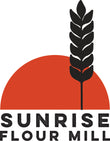In his book, "Bread Alone", Daniel Leader’s definition is "sourdough, or levain as the French call it, is an intensely alive mass of fermenting yeast, flour, and water that leavens and flavors a larger amount of dough”.
This sourdough culture is a freeze dried sample of our sourdough that we have been using for the past 6 years at Sunrise Flour Mill. We have given out hundreds of starter samples to our customers at the Mill City Farmers Market and at our sourdough bread classes that we teach in North Branch MN. Now with freeze dried technology we can mail you a sample and get you started baking delicious and nutritious sourdough bread.
This particular sourdough originally came from Italy. It was brought to us by a friend who came across it while living in Bolivia. Her Italian friend in Bolivia told her the culture had been maintained for over a hundred years and had some very unique characteristics.
At the time she offered us this starter we had our own starter that we had been using for several years. Having studied baking and sourdough we thought that sourdough cultures were local in their biological make up because every starter would eventually be made up of the bacteria and yeast cultures that were dominant in their particular area. She insisted that this was a special starter so we tried it and, sure enough, this starter is special. It obviously has maintained some unique varieties of yeast and bacteria from its original origin.
While we continue to learn about sourdough we have discovered many things as we continue to work with it.
The long slow fermentation that produces sourdough bread creates important nutrients such as iron, zinc, and magnesium; antioxidants, folic acid and other B vitamins. These become easier for the body to absorb. People with diabetes should note that sourdough produces a lower surge in blood sugar than any other bread. In a 2008 study published in “Acta Dabetologica”, subjects with impaired glucose tolerance were fed either sourdough or ordinary bread. The sourdough bread produced a significantly lower glucose and insulin response. In the sourdough process, gluten is broken down and rendered virtually harmless.
Sourdough bread improves the overall nutritional profile of flour, and gains maximum nutritional benefits from baked goods. It inhibits the growth of bad bacteria, and improves the bread's flavor, smell, and structure.
This sourdough culture is a freeze dried sample of our sourdough that we have been using for the past 6 years at Sunrise Flour Mill. We have given out hundreds of starter samples to our customers at the Mill City Farmers Market and at our sourdough bread classes that we teach in North Branch MN. Now with freeze dried technology we can mail you a sample and get you started baking delicious and nutritious sourdough bread.
About this sourdough
Every sourdough starter has a story, the lore or the mythology about its origin, like the well known San Francisco Sourdough.This particular sourdough originally came from Italy. It was brought to us by a friend who came across it while living in Bolivia. Her Italian friend in Bolivia told her the culture had been maintained for over a hundred years and had some very unique characteristics.
At the time she offered us this starter we had our own starter that we had been using for several years. Having studied baking and sourdough we thought that sourdough cultures were local in their biological make up because every starter would eventually be made up of the bacteria and yeast cultures that were dominant in their particular area. She insisted that this was a special starter so we tried it and, sure enough, this starter is special. It obviously has maintained some unique varieties of yeast and bacteria from its original origin.
While we continue to learn about sourdough we have discovered many things as we continue to work with it.
- Sourdough starters are all different.
- Sourdough starters are not all sour. This particular starter is not very sour. It becomes a personal preference and we like the more mellow bread that this starter makes. If you want a more sour sourdough starter you can develop one by using this starter then adding rye flour and letting the starter get very ripe (a long time between feedings) Also, long fermentation of your finished dough in bulk or in banneton in the refrigerator will add to the sourness.
- To make and maintain a sourdough culture you must use a flour that has not had all of the life and nutrients processed out of it. Use an organic heritage flour for best success.
The long slow fermentation that produces sourdough bread creates important nutrients such as iron, zinc, and magnesium; antioxidants, folic acid and other B vitamins. These become easier for the body to absorb. People with diabetes should note that sourdough produces a lower surge in blood sugar than any other bread. In a 2008 study published in “Acta Dabetologica”, subjects with impaired glucose tolerance were fed either sourdough or ordinary bread. The sourdough bread produced a significantly lower glucose and insulin response. In the sourdough process, gluten is broken down and rendered virtually harmless.
Sourdough bread improves the overall nutritional profile of flour, and gains maximum nutritional benefits from baked goods. It inhibits the growth of bad bacteria, and improves the bread's flavor, smell, and structure.
- https://www.theguardian.com/lifeandstyle/2014/aug/12/rise-sourdough-bread-slow-fermented-healthbendfits
- About sourdough http://breadmatters.com/index.php?route=information/information&information_id=34
- http://www.uoguelph.ca/news/2008/07/sourdough_bread.html
- Benefits and recipe https://healthimpactnews.com/2015/benefits-of-long-sourdough-fermentation/



















